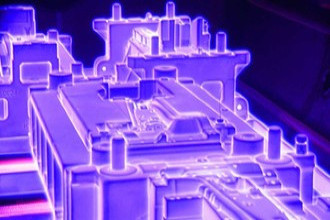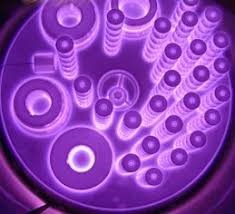The main advantages of plasma nitriding over conventional nitriding processes are : reduced cycle time, controlled growth of the surface layer, elimination/Controlled white layer, reduced distortion, no need of finishing, pore-free surfaces and mechanical masking …etc.
Plasma nitriding / ion nitriding is a modern thermo chemical treatment which is carried out in a mixture of nitrogen, hydrogen, Acetylene, and an optional carbon spending gas. In this low pressure process, a voltage is applied between the batch and the furnace wall. A glow discharge with a high ionization level (plasma) is generated around the parts. On the surface area that is directly charged by the ions, nitrogen-rich nitrides are formed and decompose, releasing active nitrogen into the surface. Due to this mechanism shielding is easily done by covering the concerning areas with a metal blanket. Plasma nitriding allows modification of the surface according to the desired properties. Tailor made layers and hardness profiles can be achieved by adapting the gas mixture: from a compound layer-free surface with low nitrogen contents up to 20 microns thick, to a compound layer with high nitrogen contents and an add-on of carbonic gas (plasma nitro-carburation). The wide applicable temperature range enables a multitude of applications, beyond the possibilities of gas or salt bath processes.


Applications & Materials :
Typical applications include gears, crankshafts, camshafts, cam followers, valve parts, extruder screws, pressure-die-casting tools, forging dies, cold forming tools, injectors and plastic-mould tools, long shafts, axis, clutch and engine parts, ferrules. Plasma nitriding and plasma nitrocarburising are often preferred to the corresponding gas processes if masking is required.
Plasma nitriding is suitable for all ferrous materials, Austenitic Stainless Steel, even sintered steels with higher porosity, cast iron and high alloyed tool steels even with chromium contents higher than 12%. Stainless steels and nickel based alloys can be plasma nitrided and keep most of their corrosion resistance if low temperatures are applied. Special applications are plasma nitriding of titanium and aluminum alloys. For heavy loads on large machine parts such as shafts and spindles, the use of special chromium and aluminum alloyed nitriding steels gives a huge benefit as plasma nitriding generates a surface hardness of more than 1000 HV.